
|
|
In Memory's Eye Recollections of Canadian Parliamentarians Honourable Members - Part 1 Somehow my memories of life in Hansard are tinctured with an overabundance of encounters with honourable members dutifully elected by the inhabitants of British Columbia to represent them in Canada's capital, Ottawa. When I first joined the staff in 1960, those members were slowly emerging from a time when their attendance in Ottawa was governed by the railway systems, Canadian National and Canadian Pacific. Because it took them three days to travel by train each way, back and forth between Vancouver and Ottawa, each round trip took a week to complete, and sometimes more if they happened to represent ridings in the hinterland of the province, or on Vancouver Island. The same, of course, applied in varying degrees to members from the Atlantic Provinces. As a result, parliamentary sessions were geared accordingly, usually only one per annum, and honourable members from east and west stayed put in Ottawa for the duration of a session, a hardship for many, an escape for some, depending on their marital circumstances. For weeks and months at a time members were condemned to endure the humidity of Ottawa summers, or the icy cold of Ottawa winters. Which was the worse it was hard to say. Air conditioning in summer was totally absent from the Centre Block where most members had their offices, and where the House of Commons Chamber became sweltering hot as the summer months progressed. Once inside the thick walls of the building, the heat had no way of escaping. It was the devil and all to keep a dry shirt throughout the day. On a personal note, I remember dashing home to my apartment to change shirts during the supper-hour adjournments, only to find the fresh shirt clinging to my back in less than half an hour. In winter, honourable members and those others of us located in the committee reporting section in the West Block, had to don winter boots, hats, scarves and gloves to trek across the snowy, blowy waste that separated us from committee meeting rooms in the Centre Block. There we would divest ourselves of our winter garb, perform our assigned tasks, put on our winter boots, hats, scarves and gloves, and trudge back to the West Block, only to repeat the process every hour or half hour in the case of reporters. I think the western members from the lower mainland of British Columbia had the worst of it, not being acclimatized either to the humid heat or the piercing cold. All that was to change during my tenure on Hansard, first with the advent of air travel by Trans Canada Airline, later to become Air Canada, and by Canadian Pacific Airline. Honourable Members could return on brief visits to their ridings, families and constituents during sessions which, with the growth of parliamentary business, extended year round, with short breaks at Christmas and Easter, and a lengthy summer recess. Also in the course of time an underground tunnel was built between the West Block and the Centre Block. During its construction a whistle sounded whenever rock was to be blasted away throughout the day, followed by the sound of exploding dynamite which reverberated throughout the West Block.
Time and again he treated the House to a verbal treatise on the merits of the Kettle Valley Railway. Time and again he recited the route taken by the Kettle Valley Railway. Time and again he reeled off the names of towns, villages, and hamlets served by the Kettle Valley Railway. Pity the hapless Hansard reporter whose ten-minute shorthand stint covered that portion of the honourable member's speech, and was obliged to verify the spelling of those place names in the far off Kootenays. They might as well have been in the far off Himalayas. Bert Herridge was a veteran of the CCF, the Canadian Commonwealth Federation, precursor of the New Democratic Party. English by birth, he had suffered a severe hand injury in the First World War, an injury he covered up by wearing a black glove on that hand at all times. As age crept up on him, his face showed new lines, new wrinkles, but his spirited advocacy for the Kettle Valley Railway never lessened. Nor did his passion for amateur theatricals. My last memory of him is of a Christmas party held by the NDP caucus in Room 118N, on the ground floor of the Centre Block. A skit was staged in which the elderly Bert, in drag, played the part of an elderly female. He enjoyed the role just as much as his audience enjoyed him. The honourable member and his beloved Kettle Valley Railway, both long gone, are now part of Canadian history.
Mr. Winch was a frequent habitué of the Parliamentary Press Gallery shebeen when that was the only place on Parliament Hill where liquor was obtainable by members of both the Gallery and the Commons, and by a small circle of House officials. It may seem almost unbelievable, but in those times Parliament Hill was a "dry" fortress, and had been so for decades. Not even the Parliamentary Restaurant served "beverage" with meals, a taboo that was only broken when Maurice Ollivier, the Law Clerk, walked in one noon, placed a bottle on his table and asked for a glass with which to drink its contents, wine. Looking back, the climate of the times lent itself to a greater abuse of alcohol by the denizens of the Hill than is the case today, when the Restaurant offers a wine list to its patrons, and a licensed liquor store occupies part of the premises. In those earlier days the Commons messenger staff as part of their normal duties ferried brown paper bags of whiskey, rum, and other potent draughts from downtown Ontario Liquor Control Board outlets to Members' offices . To return to Mr. Winch and his association with Hansard, I remember one prorogation vividly. A number of us were whoopin' it up in the Press Gallery Saloon, run by the affable George Gagnon, when Harold, "call me Harold", wandered in. The talk had been the usual end-of-session gabble about Members and their speaking habits. As we felt peculiarly suited to measure the oratorical skills of those whose every utterance we reported in shorthand on a daily basis, he basked in our assurance that he was a most effective speaker on the floor of the House. And we told him why. He was brief, he spoke clearly, he commanded attention. Such encomiums had an unexpected effect. "When the House resumes, I'll ask a couple of you to our (NDP) caucus. You can give them a few tips on speaking!" If it had ended at that, all might have gone well. Unfortunately, and I really believe it was an unfortunate happening, a first-time Member from British Columbia had joined the group and had been listening to the conversation. As a speaker he was, putting it politely, woeful. He believed that everything that could be said should be said about whatever topic was being debated. And, being subject to time limits, he said it all, without inflection, without emphasis, in monotone, at 280 words a minute. Nobody really listened. He was intense, made sense, but could not connect. Woeful he was to those he was addressing, and woeful to us, compelled to match his speed in talking with our speed in shorthand. And, it being end-of-session, we told him so. Out of the goodness of my heart I assured him he would be more attentively received if only he would vary his delivery, and stop when he had made his point. A few weeks after the new session began he was on his feet, in full flight as usual, as I entered the Chamber. In the best of all worlds, a Hansard reporter is as unobtrusive as can be, part of the furniture, seen but unseen. Alas, in mid sentence, the Member noticed me out of a corner of his eye as I walked in, stopped speaking, and sat down. His confidence was shattered. Rightly or wrongly, I have blamed myself ever since. The young member lost his seat in the next election, and thereafter forsook political life. Whatever the reason may have been, Harold Winch's invitation never arrived. And closure by Hansard reporter was never repeated. A closing note may add a certain poignancy to this brief account of Harold Winch's public career. Politics is a cruel profession. The hard knocks it gives to those who engage in it are sometimes exceedingly hard to absorb and overcome. It was during his earlier political career in British Columbia that he suffered such a fate. Following a defeat of the provincial government in the legislature at Victoria, he, as Leader of the Opposition, might well have been consulted on the possibility of forming a government led by himself. The Lieutenant-Governor chose not to consult him, and his party lost the ensuing election. It is believed that he never quite recovered from those two blows inflicted in quick succession. To those who knew him in Parliament in Ottawa, he was always a gentleman.
With such a background much was expected of him. Some saw him as the first son of British Columbia with a good chance of one day becoming Prime Minister. He was a westerner, a war veteran, and represented a new generation of Canadians, those of the immediate post-war era. But a veteran of the First World War stood in his way, John George Diefenbaker, also a westerner, who had paid his political dues in full and went on to capture the coveted post. In the Commons Fulton was a good speaker with a command of good English, a Hansard reporter's delight. Shut out from any chance of succeeding Diefenbaker as leader of the federal Progressive Conservative Party, he returned to his native province where he was elected leader of the provincial Progressive Party, doomed to lose against the governing Social Credit Party let by W. C. ("Wacky") Bennett. Fulton was a Canadian who served his country well in peace and war. In politics his was a story of what might have been.
Two other British Columbia members who made their mark in the Commons in the early 1960's were the Hon Howard Greene (Vancouver Quadra), and Erhart Regier (Burnaby Coquitlam). Two more different personalities could not be imagined. Greene was patrician in bearing and speech, and served as Secretary of State for External Affairs in Diefenbaker's cabinet; Regier was an earnest, hard-working member of the Cooperative Commonwealth Party and the New Democratic Party. Greene spoke in remarkably low tones. In contrast, Regier's voice sounded harsh. It was left to Regier to provide a remarkable example of self-effacement, one not often seen among politicians, by resigning his seat to make way for the entrance of Tommy Douglas as Leader of the New Democratic Party. Douglas went on to press the minority governments of Pearson to pass some of the most progressive social legislation in Canada's history. Regier deserves remembrance for his self-sacrifice. From little acorns, mighty oaks. The other extremity of Canada, Newfoundland, provided me with a number of incidents that had a profound impact on my career and on my personal life.
Newfoundlanders, as I discovered, are a tight bunch. You can interpret that any way you wish. What is meant here is that they are family, no matter how far astray from The Rock they wander. They like to gather together whenever they can. In any Newfoundland pub across Canada they enjoy their social life. And they never forget where one of their own may be found. A striking example of that was Joseph Smallwood, the artful "Joey Smallwood", who led Newfoundland into Confederation with Canada in 1949 and who was Premier of the province for years afterwards. The stories surrounding him are beyond legion. All I can add in my own small sphere is that one of the reporters on the Hansard staff when I joined it was Don Butt, a Newfoundlander, and whenever Joey came to Ottawa on federal-provincial business he always dropped into the Hansard office to see Don. A Premier visiting the Hansard office to exchange pleasantries with a reporter! Unheard of, unimaginable, un- un- higher-ups spluttered to find an appropriate word. To return to Herman Batten, he was the Deputy Speaker when it came time for Don to retire, and Herman held a party for Don in Room 118-N, attended by all and sundry. I was one of the sundry. The lady who became my wife was one of the all. It was the first time we met. Herman Batten has a lot to answer for, including two darling daughters and my future marital bliss. In later years when I visited St. John's I was greatly taken by the fact that the cab driver at the airport had a pronounced Irish accent, so much so that I asked him when had he left Dublin. He laughed. "Not long. Five generations or so!" As days passed I felt more and more at home. The Newfoundland sense of humour is close to the Irish sense of humour. And why shouldn't it be? There's only the Atlantic between them, three thousand watery miles of it.
Both the riding and the member's name were engraved in my memory. There was something majestic to the rolling intonation of Grand Falls-White Bay-Labrador. Once learned it was never forgotten.
A sort of glazed look would come over his eyes. Here he was, in the full grandeur of ministerial office, and here was this idiot who persisted in calling him "Mr. Granger". I could no more quit the habit than I could smoking. As a matter of fact, as time passed I did quit smoking, very successfully I should add, but the Honourable Don Jamieson, Canada's External Affairs Minister, for all his official dignity, remained "Mr. Granger". I was later informed by Harold Stamp, the Editor of Debates in the House of Assembly in St. John's, Newfoundland, that Mr. Jamieson he did not see any humour in it. Jamieson was a broadcaster in his early years, and had a wonderful booming voice, a pleasure to listen to and to report in Gregg or Pitman shorthand. He last held office as Canada's High Commissioner in London.
When it fell to Joe Clark to form his cabinet, and although both merited inclusion, having two Cabinet ministers from the city of St. John's was for many reasons politically unacceptable. He chose Crosbie to be Minister of Finance, and the latter went on to earn the dubious distinction of having his first and only Budget defeated in the House, precipitating a General Election which a resurrected Pierre Trudeau and his Liberal Party won. McGrath soldiered manfully on, but did not find favour with the next PC Prime Minister, Brian Mulroney, who in typical fashion generally referred to him as "the distinguished Member for St. John's East", and hived him off to run a committee studying parliamentary rules and procedures. Listening to Mulroney day in and day out, any time he referred to someone as "the distinguished" this or that it came to symbolise that that particular individual was not a particular favourite of his. McGrath strove to amend the Standing Orders of the House of Commons so as to give backbenchers a greater role, a more significant voice, and a measure of independence they so badly need. For that he will be remembered. He ended his career in public life as Lieutenant Governor of Newfoundland and Labrador.
Pickersgill is known today as a biographer of his long-time boss Mackenzie King, whose careful editing of King's diaries concealed much about the man. It wasn't until decades later than Canadians in general became aware that King was an eccentric, a spiritualist who attended seances which purported to put him in touch with his dead mother and with his dead dog Pat, and who meticulously recorded the time shown on clocks when he made decisions. In the Commons, Pickersgill's nickname was earned through his practice of jumping to his feet on points of order on any and every occasion that he saw his Liberal Party under attack, a regular jack-in-the-box, ready to do battle, armed with precedents and quotations from Bourinot and Beauchesne, then the two authorities on Canadian parliamentary rules and practices. And he had wit. Once, when the uptight, prudish Conservative Donald Fleming, who was Diefenbaker's Minister of Finance, had returned from an international conference in Paris, Pickersgill ventured that the Minister had been interested in matters other than high finance. The Speaker was Marcel Lambert, who ruled with an iron fist, or so it seemed to the Opposition, as they sought day by day to embarrass Diefenbaker and his ministers. In an effort to maintain decorum, Lambert sought to enforce the rule that whenever the Speaker intervened to cut off Members when in full flight, only the Speaker's voice should be heard, in other words official notice should not be taken of any Member then speaking. Pickersgill's sally was to the effect that Fleming had become more interested in Place Pigalle than in his official duties. It drew guffaws from colleagues. Unfortunately, Lambert, the Speaker, had called him to order before he uttered the words "Place Pigalle", and thereby those words could not be reported. It may have appeared a minor incident to most observers, but Pickersgill attempted to turn it into something more. When he saw that "Place Pigalle" was omitted from his "blues", the pre-publication report of speeches supplied to Ministers and former Ministers, he came sailing into the Hansard office of then Editor of Debates, Warren Buskard, to demand an explanation. When it was explained to him that Hansard was merely following the Speaker's edict, Pickersgill threw a fit. What right had Marcel Lambert to cut him off? It was dictatorial, it was an affront to Parliament, it was --and he sailed out of the office to tackle the Speaker on the matter personally. It did him no good. The Speaker's ruling stood, despite "Jumping Jack's" fuming and puffing. Pickersgill's speaking voice was a cross between a cackle and a quack. Its distinctiveness penetrated through loud uproar, and in his time he was a parliamentary strategist of great ability.
It was at an evening meeting of the committee when Walter Pitman, a high school teacher, who had been elected the Member for Peterborough, Ontario, in a by-election only months previously, posed a question to the chief witness, Lorne Gray, the Chairman of Atomic Energy Canada. AEC favoured one particular process, later widely used in CANDU reactors built for use in Canada and also exported abroad. Pitman's was a relatively simple question. The answer was anything but simple. As I was taking it down in shorthand, I placed a notation to query it later. It didn't seem to make sense, and I knew that Charlie Empringham, the committee branch editor, was bound to question what I would transcribe. At the end of the meeting I went to Mr. Gray and explained that I wished to check what he had said in his reply. He waited graciously as I read out, word for word, exactly what he had said. Then I asked was what I had taken down what he meant to say. "Yes," he replied. "But it doesn't make sense," I blurted out. Remember, I had just been in Canada a few months at the time. He smiled, and said: "Leave it exactly as it is." I had learned a valuable lesson which was to stand me later in good stead. In fairness to Mr. Gray, and in view of recent scandals involving the huge meal and entertainment expenses of some public office holders, I must record that when asked about the great number of meetings he had to hold, and how he could find time to do so, he said he found lunch a fruitful time for discussions and consultations. On such occasions, lunch was prepared by a member of his staff, if memory serves, by his secretary, and eaten in the boardroom. What an example for the mandarinate of today! Walter Pitman was a decent, sincere, and dedicated member of the newly formed New Democratic Party. His career in Parliament was quite short but memorable.
She earned the respect of members on both sides of the House. Not given to histrionics, she quietly and efficiently responded to questions. In her person and deportment she was the ideal Canadian to herald the advancement of women to cabinet rank. Many others would follow, making their mark as befitted their individual talents and temperaments, often objects of fierce media scrutiny, but all beholden to Ellen Fairclough, first lady member of government in Canada.
It was thanks to Dick Bell that I first gained admission to the Visitors Gallery reserved for guests of government members, and there I sat, day after day, learning to recognize the faces of Members seated below. It was a good vantage point from which to study not only their physiognomies but also learn to recognize their widely diverse accents. Bell had a unique background within the Progressive Conservative Party. He knew its innermost workings. In his early twenties he became secretary to the then Minister of National Revenue, assistant Dominion Organizer for the party, private secretary to the PC Leader of the Opposition, National Director of the Party in the 1940s, and served as chairman of its National Campaign Committee and of its 1956 National Convention held in Ottawa. In later life he served the cities of Ottawa and Nepean with distinction, and in various capacities with Carleton University, the Queensway Carleton Hospital, and the Canadian Cancer Society. I remember him as a kindly, affable man, unstinting in his service to Parliament and Party.
It was a personal win without parallel in post-WWW II Canadian history. Howe had seemed unbeatable. Fisher's victory gave heart to "the common man", a term still in vogue, and helped inspire the drive to establish the New Democratic Party which would unite the forces of agriculture and labour and, with luck, become a credible alternative to the Liberal and Conservative parties. Doug Fisher soon became a man to be reckoned with on Parliament Hill. His war-time service as a trooper in the Canadian Armoured Corps from 1941 to 1945 gave a sense of discipline that he exercised throughout his career in the Commons and in his later life as observer and shrewd commentator on politics, both in print and on television. He never shrank from tackling the powerful, in and outside Parliament. His annual battles, and there is no other word to describe them, with Donald Gordon, hefty, over-bearing President of Canadian National Railways, became the stuff of legend. Estimate hearings into the affairs of the CNR and its airline, TCA, later to become Air Canada, were held each year in the Railway Committee Room in the Centre Block of Parliament Buildings. A spacious room, it was also used for Liberal and Progressive Conservative caucus meetings. Gordon would enter the room with a coterie of managers of this and managers of that, ready to assist him if needed. Fisher depended on his own research which he used to great effect in the coming fray. And he refused to be brow-beaten. Usually the room was filled with an audience drawn irresistibly to listen to the exchanges. The parliamentarian and the great railway panjandrum never disappointed. After quitting the political realm, Fisher soldiered on as only an old trooper can, adding to his reputation as a good and worthy servant of Canada, championing its sports, especially hockey -- ice hockey for those ignoramuses who don't know better -- and entered on a lengthy career in journalism. Years and years later, when I met him in a Loblaw's grocery store in Ottawa, he still was able to recall the names of Hansard reporters whom he knew during his time "on the Hill". The NDP never met the hopes once held for it, and was destined to become "the conscience of Parliament" rather than a serious alternative to the Liberals and Conservatives.
Hales followed a well trodden path on his way to the Commons, Director of the Y.W.C.A., President of the Guelph Chamber of Commerce, Alderman of the City of Guelph, Navy Reservice sub-lieutenant, and Kiwanis club member. He had been a graduate of the Ontario Agricultural College in scientific agriculture, and proudly listed winning the North American Meat Judging Award among his earlier accomplishments. It was largely, if not mainly, due to his regard for the House of Commons as an institution that a major change was effected in the staffing of the Chamber. Pages had traditionally been engaged locally. Many came from poor backgrounds, and the sessional employment they received helped lift themselves and their families one rung up the ladder in the climb to better economic conditions. Some boys became pages at a very early age, and with the passage of time became permanent members of the staff. One of these was Eddie Quirk of Alymer, Quebec, who was 12 when he joined the page staff in 1928, and spent the next 54 years in the service of the House, most of them in the Hansard office. Hales thought there should be a better way, and he advocated that pages be recruited from the undergraduate body of students attending Canadian universities. His idea was adopted by the House, with the result that each year a new crop of Canada's youngest and brightest undergrads don the black uniform that denotes their status as pages, and perform their tasks while still continuing their studies at university in Ottawa. Young women and young men from all across Canada are eligible, provided they meet certain qualifications. Their year in the lower echelons of Parliament provide them with a variety of experiences. Another groundbreaking initiative has been the award of internships to older students who work directly with Members in a wide range of occupations, valuable in later years should any of them seek election as Members of Parliament. To Alfred Hales, all hail for his vision, his dedication, and persistence in pushing through a scheme that benefits young people from every province.
Bonhomie was his personality in the old fashioned sense of the term. He could flatter, he could beguile, he could charm all who met him. And he was a survivor. He served two terms as a Minister in the Diefenbaker governments, first being appointed Minister of Transport in 1957, and Minister of Trade and Commerce in 1960. He was the only Conservative minister of that era to become a member of the cabinet in the Mulroney governments, becoming Minister for Veterans Affairs in 1984, and Minister of State (Senior Citizens) in 1987. In both posts he performed admirably. In private life he helped the less fortunate, quietly, thoughtfully, the very opposite of his public persona. At one time we shared the same osteopath, the very dignified Dr.Linnen in Ottawa, with whom he liked to talk openly and frankly, and I came to know something of the man beneath the political veneer. It was often joked that he was he only one in the incoming Mulroney government who knew where the Cabinet Room was located. Mulroney himself admired the way the old veteran of war, peace, and politics handled himself in the Commons, and often was the first to applaud him when Hees sat down after a bewitching, disarming exchange with a member of the Opposition. Hees was very conscious of the public record. After each and every intervention in debate or Question Period, he would buttonhole the Hansard reporter leaving the Chamber to be sure that some bon mot or telling phrase had been caught. And he always made time to visit the Hansard office and check his "blues", the copy of their speeches sent to Ministers for verification. He did not care to have his "blues" sent by messenger. They were too important. He checked them in the Hansard office to make certain that reporter, editor, and he were at idem. When he indicated his intention to retire, not alone did his colleagues give him fulsome praise, but many long-serving members of the House of Commons staff, cleaners, porters, constables, messengers, waiters, clerks, administrators, and the people of Hansard went to him to say it was an honour to have served him. When Hees departed, gentlemanly conduct lost one of its greatest practitioners in the long history of the Commons.
In mid-life his was a commanding presence, golden locked, strong faced, a head that would not be amiss on the coin of a long departed Roman emperor, and with a voice that carried above heckling and demanded to be heard. Unfortunately he never achieved the ultimate power that he sought and had to labour under a succession of Prime Ministers, St. Laurent, Pearson, and Trudeau, all of whom held the top spot to which he himself aspired. His most notable ministerial portfolio was defence, which he held for four years from 1963 to 1967. He had spent time in the Canadian Armed Forces before being first elected a Member of Parliament in 1949, serving in both the Royal Canadian Air Force and the Royal Canadian Artillery. It may have been from that background, serving in two branches of the Forces, air and ground, that he was convinced it was his destiny to unite air, ground, and sea commands into a single unified structure. When he introduced legislation to unify the services he drew upon himself an outpouring of condemnation, not just from the entrenched military leadership but also from those Members of Parliament who had served in one or other of the three branches. A lesser man might have bent under the pressure brought to bear on him, but not Paul Hellyer. He was a man of utter conviction, and for once he had the support of his Prime Minister and his party. He won his battle, but the political war which followed eroded the confidence that party colleagues had placed in him. He lost the Liberal leadership campaign which replaced Pearson with newcomer Trudeau as Prime Minister, and toward the end of his days in Cabinet served as Minister of Transport under the latter. After quitting the Liberal Party in 1971 he led a varied life, as the author of Agenda: A Plan for Action, as one of the few Canadians to seek a return to the Commons as a member of a party he had long opposed, the Progressive Conservative Party, and as a syndicated columnist for the Toronto Sun newspaper. An attempt to foster a new nationalist political party went nowhere. To repeat, Paul Hellyer was a man of conviction, but where others had the ability to maintain their balance in the shifting sands of political life, he lost his footing.
In their prime they were fine specimens of manhood, all well over six feet tall, and with a natural grace and dignity that, not to put a fine tooth in it, seemed part and parcel of westerners who came to Ottawa in those days to speak not only on behalf of western Canada but also carrying with them a vision of what Canada could become if only those darned easterners would pay attention to their grievances. Hugh was a doctor and the quietest of the trio. Albert was a farmer, a breeder of pedigree cattle and horses, with much experience of the wheat pools that at the time dominated the lives of farmers, told them what they could grow, and how much of it. Not quite fifty years later, the Canadian Wheat Board still holds a firm grip over western agriculture. Western farmers are by law bound to sell their grain to the Board. If they attempt to sell their produce to whom they wish, especially to markets in the United States, they are liable to fine or imprisonment.
Just how much public attitudes have changed in Canada since the 1960s can be measured against one speech by the outspoken Jack Horner. For whatever reason he once railed against the unlawful activities of those who bought and sold Irish Sweepstakes tickets in Canada. Canadians, he maintained, were not gamblers. It was beneath them to invest in Irish sweepstakes tickets. At the time the safest place to buy Sweepstakes tickets, without fear of prosecution, was Parliament Hill, something well known to Members and staff alike. Whether he spoke with sincerity or with a sense of humour I could never figure out, but today Canada is one of the nations on earth most addicted to gambling. Lottery tickets, casinos, race tracks, all take a sizeable slice of the national economy. Jack Horner went on to contest the leadership of the Progressive Conservative Party when the old chief, Diefenbaker, was forced out, but his candidacy was a long shot and he ended fifth in a field of six. It was her misfortunate to be somewhat heavyset in physique, and cartoonists were cruel in many of their depictions. Her temperament was easily goaded. She was one of the most prominent female politicians of her era, a time when many men were still struggling to come to grips with the fact that women actually could become powerful Ministers in their own right. Judy LaMarsh produced her own book of memoirs which, though out of print, is worth seeking out because in it she gives a vivid picture of life in politics as she found it. Its title A Bird in a Gilded Cage is particularly well chosen. A fighter throughout her career, she was apt to fire off some remark that enraged opponents. This was particularly so when the estimates of her department, Health and Welfare, came before the Commons for scrutiny. More skillful or experienced Ministers would succeed in having their departmental estimates sail through without intensive examination. But not the Minister of Health and Welfare. On one occasion when everything seemed to be proceeding smoothly, she took umbrage at some unchivalrous remark or perceived slight, and responded vigorously. As a result, the examination of her department's estimates dragged on and on. She was a fiercely partisan politician who served her Prime Minister, Lester B. Pearson, well. As Secretary of State she was the official greeter who met all visiting Heads of State who came to Canada for the centennial celebrations, no mean task in a year when two or three foreign dignitaries might arrive within hours of each other on the same day. It was a hectic schedule, and required meticulous attention to times and details. She represented the constituency of Niagara Falls, Ontario, and may have drawn some of her unending energy from its loudly tumbling falls. Canadians can be proud of Judy LaMarsh who suffered an all too early death. The women of Canada can be proudest of all. During her tenure twin towers were built in Ottawa to house her huge staff of public servants. They may have a politically correct proper name, but from the start they were called Judy's Towers, and that name lives on to this day.
A tall, gaunt man, he was an elder statesman of the party who had watched it swim and sink, rise and fall, in his many years as observer and counsellor prior to seeking a public role in politics. Born in 1884, he was 76 years of age when I first laid eyes on him, sitting in the front row on the government side of the House of Commons, and close to the Speaker's Chair. This meant he was a goodly distance from the Hansard reporters' desk, and at a time when the Chamber lacked a satisfactory sound amplification system his soft tones were scarcely audible to them. He enjoyed a reputation that placed him above the usual fray between Opposition and Government. He was trusted as a man who stood on principle, and who acted on principle. Having been appointed a Minister without Portfolio by Diefenbaker in 1957, he resigned from the Cabinet two years later in 1959, and was content to serve as a simple Member from that day onwards. Macdonnell was a vetaran of the First World War in which he achieved the rank of Brigadier-Major in the Canadian Field Artillery, and among the decorations he won were the Military Cross and the French Croix de Guerre. The Canada he served has undergone great change since he died in 1973, but his legacy of valour, honour, conscience and honour remains as an ideal others might seek to emulate.
In addition to his constituency duties, Heath Macquarrie became an unofficial ambassador for the islands of the West Indies and propagandist for their leading export in spirits, rum. Each year he hosted a party on the Hill at which he extolled its quality. In Opposition his leading role was that of PC critic for the Post Office. Postal services were a regular item of complaint, especially during the years when strikes were staged by unions representing the workers. A feature of parliamentary debate was the "Late Show", which took place usually between 10 and 10.30 p.m. If a matter was of sufficient gravity, and a Member thought he had not received a full and satisfactory answer to questions he had asked earlier in the day during the regular Question Period, he could seek permission from the Speaker to raise the subject of his questions during that evening's Late Show. Came the day that Macquarrie was the beneficiary of one such permission. Under the rules he was granted seven minutes to voice his concerns, and the Minister had three minutes in which to reply. Normally during the Late Show the Chamber was deserted, save for the one, two or three Members with issues to raise, and a like number of Ministers, or their stand-ins, to reply. To Macquarrie's chagrin, Kierans rose from his seat and disappeared from view behind the back row curtains. Macquarrie believed he was insulted, and why not? There was no Minister to hear his "remarks". He thundered, his performance that of a veritable volcano, and the more he thundered the more a desk behind him was thumped in appreciation. Unnoticed, Kierans has made his way behind the curtains over to the Opposition side of the Chamber, and had taken a seat a few rows behind the now almost apoplectic Macquarrie. Encouraged by his unknown supporter, Macquarrie pulled out every stop in the organ of his oratory. When he finally ended and resumed his seat, he saw the grinning Kierans sitting behind him, who then rose, walked across the Chamber, and standing in his proper place expressed his admiration for the performance Macquarrie had just delivered. Such moments come rarely in Parliament. They help give a human face to all that happens in that august institution. Outwardly, Heath Macquarrie gave every indication that he was playing a role, and that he tailored his personality to fit the part assigned him. Inwardly, he was a much read man, with a kind heart, who cloaked his many acts of generosity from public view. Mr. Mandziuk, who represented the riding of Marquette in Manitoba, was one of the early group who entered politics in the post-war years who was proud to claim a Ukrainian backgound. He qualified to practise law, was a schoolteacher, and occupied a number of positions at the community level before being elected as a Conservative in the Diefenbaker upset defeat of the governing Liberals in 1957. His given name was Nicholas, but to me he was always Mr. Mandziuk. Perhaps as an immigrant myself I subconsciously admired the man from Marquette who first saw the light of day in 1902 in far away Ukraine. He deserves to become the subject of a well researched biography by some budding Manitoba historian or circle of students.
What I and my colleagues saw and experienced was the almost flawless sense of ease which the father displayed in debate, in the thrust and parry of the daily Question Period, and in something more intangible, a sense of belonging. The Honourable Paul Martin, was almost sixty years old when I had my first experience of him. By then he had a lengthy curriculum vitae listed in the little red book, the Canadian Parliamentary Guide, which has cryptically recorded the entrances and exits of the country's parliamentarians year by year, and is an indispensable handbook for anyone interested in politicians, both past and present. It was during his tenure as Secretary of State for External Affairs that one of his greatest talents became evident, at least to my colleagues and me. He had a wonderful gift of obfuscation, of answering questions at length without intruding on specifics. I, at least, had encountered the type before when working on the official reporting staff in Dáil Éireann, the Irish Parliament in Dublin. Éamon de Valera, the Irish Taoiseach, was a past master of the art. It is doubtful if he and Paul Martin ever encountered each other, but each could readily recognize a fellow artist. To put it bluntly, they both tried the patience of listener and reporter as they wove their thoughts into intricate patterns of phrase, serpentine soliloquies, entering maze after maze of linguistics, and almost limitless qualifications. It was afterwards that the real work began-how to translate the heap upon heap of verbiage into sentences from which a glimmer of meaning could be extracted. I have written elsewhere of de Valera. The best summation of the Honourable Paul senior came from a colleague on Hansard, Roger White, who claimed that he had written Canada's foreign policy for months. By judicious trimming, cutting, and transplanting, he had been able to provide sense and meaning hidden in the undergrowth of the Minister's effusions. Paul Martin senior served Canada well and capably. It was his misfortune to contest twice for leadership of his Liberal Party when new faces were thought to be the answer to ensure continued retention of power. Pearson and Trudeau were those faces. Like others of his predecessors he faded into the obscurity of the Senate, only to be rescued and appointed High Commissioner to Britain in 1975, then the highest post in the Canadian diplomatic service, for which his talents suited him admirably. His career was full of distinctions and honours, and when he was Minister of National Health and Welfare he introduced progressive social legislation which underpins all advances made in health and social services ever since. To a future commentator must be left the story of his son's career.
Chevrier presented a much different appearance from his friend on the political stage. Where sonorous might be applied to Martin, Chevrier's manner of speaking was precise and clear-cut. Martin over time became slightly overweight. Chevrier retained a clean-cut physique. Martin, the gentleman, Chevrier the patrician, both were skillful in debate. Of special interest was Chevrier's appointment as Canadian delegate to the Bretton Woods Conference in 1945. Mention of Bretton Woods may draw a puzzled look in 2005, but it was the foundation of international fiscal and economic policies that spurred the recovery of world trade and international finance from the dismal depths to which World War II sank them. As the Member for Stormont, Chevrier was the personification of an older generation of politics who regarded public service as a duty, not merely a part-time occupation which might pave the way to success in other endeavours. And he shared with Paul Martin a common trait. They were the best dressed men in the Chamber of those times. Here a note of self glory must be introduced. The year was 1963. Free for six weeks in summer, I spent that time improving my skills as a shorthand reporter on assignment to various international bodies. One was the Food and Agriculture Organisation meeting in Rome. The extra pay it brought tempted me to enter a renowned men's tailoring establishment and gratify myself by ordering a custom made suit. Wearing my Italian designed, hand-tailored, dark blue silk suit, I drew a never to be forgotten compliment as I took my seat at the Hansard reporters' desk when the House resumed sitting. It came from the Officials Gallery. "There are now three well-dressed men in the House, Chevrier, Martin, and ……." False modesty forbids me naming the third! Sic transit gloria mundi. "Yukon Erik" was the lone voice of the Canadian North to retain his seat, come weal or come woe, from 1957 to 1987. And that voice was listened to, with anguish or applause, by members on both sides of the aisle in the Chamber of the Commons. Whether supporting or attacking, Nielsen was a formidable friend or implacable foe. In the arena of party politics he was the ultimate partisans' partisan. Yet for all that he spoke in mild tones, seldom raising his voice, and was that rare wonder, a parliamentarian who spoke in sentences, subject, verb, object, adjective and adverb all in their proper places. He was a delight to report and transcribe. It is from the perspective of Editor of Hansard that I came to know the influence he wielded. At a time when a new administration was brought on to the Hill by Madam Speaker Sauvé, a determined effort was being made to abolish the English Hansard reporters and replace them with recording machines. A staff vacancy occurred. And another. Sanction to recruit new reporters, who might be drawn from any of the nine English-speaking provinces and two territories, was held up. Within forty-eight hours of being informed of the situation, Erik Nielsen cut through the official balderdash, and Hansard was permitted to advertise across Canada to fill the vacancies. It is for others to spend time and resources writing the political life of the man. For present purposes it is sufficient to relate that Erik Nielsen was never "a nobody a hundred yards from Parliament Hill", as backbenchers were once described in a moment of pique by Pierre Trudeau. It was my good fortune to act as court reporter in January, 1963, at the preliminary trial held in the Yukon capital, Whitehorse, in a famous murder case which made newspaper headlines in Canada and France. Karoly Marsi, a young refugee, was admitted to Canada following the Hungarian revolt against the Russian forces occupying his country in 1956. Unfortunately he became a drifter without steady employment. In the summer of 1961 a young French visitor, the grandson of a man who had taken part in the famous Yukon gold rush, decided to retrace the route his grandfather had taken. He made it to Dawson City, had the good luck to meet someone who apparently remembered his grandfather, stayed a short while, and then began hitchhiking down the Alaska Highway on his way home. He never made it back to France, and in the spring of the following year the RCMP began an arduous, painstaking search operation, during which a small aircraft crashed killing one of the main investigators, a Corporal Absell. The scattered bones of the French visitor were eventually located, circumstantial evidence linked Marsi to his disappearance, hence the Whitehorse court case. As I was reporting in my flawless Gregg shorthand, I looked up one day to see Erik Nielsen who had dropped in to listen to part of the trial, and as the days passed I learned from townspeople just how highly they regarded him and were proud to have him as their representative. How did the story end? The case was eventually dismissed by a higher court in Vancouver. Karoly Marsi was released, and a few years later was discovered dead, hanging by the neck in a prison cell in Montreal. As if I haven't intruded enough on this tale of "Yukon Erik", the case coincided with the annual beard growing contest in Whitehorse, and I landed back in the sedate surroundings of 1960s Ottawa with a salt and pepper beard that was my pride and joy. When the House resumed sitting I had to shave it off. Beards in those times were for hippies and not acceptable to be seen on the floor of the Chamber of the House of Commons.
Flanders and Swann, Oliver and Hardy, Abbott and Costello, there are some duos of whom the mention of one name invariably calls the second to mind. That the aforesaid trio of duos were popular entertainers should not be interpreted to mean that the fourth duo, Peters and Howard, gained the limelight as parliamentary comedians in their time. Arnold Peters from Timiskaming riding in Ontario, hardrock mining country, and Frank Howard from the constituency of Skeena in British Columbia, fishing and timber country, were an odd pair who changed the way some things were done in Parliament, and changed them for its own good. There was a time, and now it seems a long time ago, when the newest province to enter Confederation, Newfoundland, had a system of laws which forced those seeking a marriage divorce to petition the Canadian Parliament, sitting in Ottawa, to grant them the dissolution they sought. It was an extraordinary procedure. Cases were initially examined by a Senate Committee, and the ritual usually involved a detective giving evidence of one party or the other being found in flagrante delicto in an hotel room. When Senators were in a hurry -- sounds like a contradiction in terms -- one of them was wont to hurry things along by saying to the detective giving evidence, "Come on, man. Hurry up. Get them in bed!" After the Senate exercised its sober judgment, cases were passed on to the Commons, which usually dealt with them before adjourning on Friday afternoons. Arnold Peters and Frank Howard joined forces to drag out debate on each case. Eventually the backlog of cases grew and grew. It was a classic example of justice delayed being justice denied. It was harsh on those seeking relief, so harsh that the government was forced into making arrangements for jurisdiction over divorce proceedings being transferred to the province where it should have resided in the first place. In their own way, Arnold Peters and Frank Howard were the pioneers who led the way to the day when, many years later, Justice Minister Trudeau proclaimed: "The State has no place in the bedrooms of the nation." Peters and Howard went on to refine their act when it came to passage of government estimates. When they held up business for too long, somehow word was conveyed to them that a needed wharf, bridge, or road in their ridings would receive priority attention, and debate would end. As parliamentary hold-up men their record survives as a unique lesson in obstruction for the sake of construction.
Until then it was a white man's club. The election of the first Canadian of Chinese descent to the House was that of Douglas Jung, in the riding of Vancouver Centre, in 1957. Jung brought with him excellent credentials from his career as barrister and solicitor, and as a veteran who served in the Intelligence Branch of the Canadian Army from 1943 to 1946. He was a quiet but clear speaker, a member much concerned with representing the Chinese population of Vancouver which, over the intervening years, has burgeoned into the largest ethnic group on Canada's west coast. Diefenbaker took much satisfaction from the fact that he had been attracted to the Progressive Conservative Party, as he also did from the fact that he, as Prime Minister, had appointed the first Canadian native aboriginal as a member of the Upper House, Senator James Gladstone of Lethbridge, Alberta. In passing, it may be of interest to recall that Gladstone was a member of the Blood Tribe of the Blackfoot Nation, whose name, Akay-na-muka, in English translation was "Many Guns".
It was Matheson who chaired the parliamentary committee that sat for months before deciding, almost by happenstance, on the final design of the red maple leaf on white between two red panels. The fuss raised by Prime Minister Pearson's decision that the time had come for Canada, as an independent nation, to have its own flag, can never be fully grasped by succeeding generations. Until then, Canada got by using a version of the Red Ensign, a British flag, which was constant a reminder of its colonial past. When the committee reported back to the House with the Maple Leaf as its choice, the debate that followed led to one of the most uproarious, emotional, unruly scenes ever witnessed on the floor of the House. It rivalled the historic Pipeline Debate of 1957 in intensity, and exceeded anything that followed, including the 1982 constitutional debate. Matheson had served overseas in World War II with the Royal Canadian Horse Artillery from 1940 to 1944, and suffered wounds in Italy that led to his retirement with the rank of Captain. He was a participant in the battle for Ortona, the fiercest engagement of the Italian campaign between volunteer German and volunteer Canadian troops. As a result of his wounds he walked with a limp. His speeches in the House were a wonder to behold and report. On his desk he placed an attaché case from which he extracted an endless supply of documents, mainly quotations, which made up a large, if not major, part of his argument. These he replaced helter-skelter in a disorderly mess after he finished speaking, and sent the attaché case up to the Hansard office so that his quotations could be verified, one of the most important tasks of the compilers of the Official Report. Three, four, or five reporters, depending on the length of his speech, would gather around the opened case and attempt to find the pertinent quotations each had reported. Frenzied pirhanas attacking prey in the Amazon River is the only simile that comes to mind. Matheson deported himself as a gentleman throughout the long days of the flag debate, and earned a lasting and honoured position in Canada's parliamentary pantheon. Following his service in Parliament he became a judge.
He had been a parliamentary assistant to the legendary C. D. Howe, the all-powerful Minister of Reconstruction and Supply. Howe had been Minister of Defence Production during World War II, knew everybody in industry, transport, and public service and, more importantly, knew how to get things done, the right levers to press, the right doors to push, the right turns to take in the labyrinthine maze of mandarin dominated Ottawa. McIlraith learned from Howe, and as his career progressed in Parliament he inherited some of Howe's mantle, particularly in dealing with recalcitrant public servants. His hand seldom showed, but if results were what was wanted by a succession of Prime Ministers, it was to George McIlraith they turned. At one time he enjoyed more influence on Parliament Hill than any official, and in the Commons proper he knew how to maneuver the passage of government business quickly and efficiently through to final adoption. He enjoyed politics. He knew how the game was played. Even after being relegated to the Senate, his interest in the political doings taking place in the Commons never flagged, and he was often to be seen watching and listening to what transpired in the place he loved so well, usually from a spot in the public gallery rather than from the more exposed Senators Gallery. He had a lean figure, spoke in a quiet voice, almost inaudible at times, and had remnants of sparse red hair circling his temples. Also, he wore glasses. I was shocked out of my standing a couple of times when members of the protective staff mistook me for him, and called "Good night, Senator!", or "Good day, Senator", as the time warranted. It was they who should have been wearing glasses.
By profession a chartered accountant, he sidestepped provincial politics and took the direct route to the loftier federal platform, being first elected Member of Parliament for Perth in 1953, and becoming Minister of National Health and Welfare in 1957. He was a loyal follower of Diefenbaker, in good times and in bad. He embodied the tenets of political conservative politics. A staunch upholder of tradition, he was a fierce opponent of any move to sever traditional links with what he had been taught was "the mother country", Great Britain. Loud in his denunciation of Grits (Liberals) and Grit policies, he was a trenchant fighter for his beloved Tories (Progressive Conservatives) and Tory policies. He made his position clear on whatever topic came up for debate, spoke clearly and without equivocation, and was a gift to the Hansard reporters taking down his interventions in debate. Like Diefenbaker, he decried the removal of "Royal" from the Canadian Postal Service, and raged against the removal of the Red Ensign as the national flag. A man of his times, he never concealed his feelings. Jay Waldo Monteith. The name demands to be spoken aloud.
The elder Nowlan inherited all the grace and charm bestowed on him at birth by an Irish father and French mother. The blending of the two races, he grew into one of the most well-liked men ever to sit among colleagues in the House of Commons. He earned and held the respect of his peers. Contentious partisan party politics he eschewed, and friendships he engendered in whatever role fate cast him, in Opposition or in Government. Born in 1898 he carried with him into the twentieth century what seemed to be old-styled manners and comportment, but in fact they were the common courtesy found in every age. Like so many of his generation he served overseas during World War I, and on his return to Canada settled down to married life, earning his living as a barrister. Bitten by the political bug, he entered provincial politics and was elected a member of the Nova Scotia Legislature, first in 1925 and again in 1928. Twenty years later, in 1948, he won his first federal election, and ten years afterwards he was appointed Minister of National Revenue by John George Diefenbaker. The two Georges had completely different personalities, Diefenbaker aloof, distant; Nowlan friendly, easy to know. It is for others to retrace his political career. From the perspective of a Hansard reporter, Nowlan was a gifted speaker who never faced an adversary of whom he did not make a friend. Not many have such a gift.
On returning to Nova Scotia he followed his father into federal politics, and won his first election to the House of Commons in 1965. Cheerfully he fought the good fight as a backbencher in the Progressive Conservative Party, being returned in general election after general election, and with his friend, John Michael (Mike) Forrestall (Dartmouth-Halifax East), waged war on their Liberal opponents for many, many years. As Pat and Mike they were linked together in many a political caper. Mention of the Annapolis Valley in Nova Scotia never fails to bring to mind two of its brightest political apples, George the father, who represented Digby-Annapolis-Kings, and Pat the son, who represented Annapolis Valley-Hants.
A third of the membership on average changed with the holding of each general election. Added to the roughly 2,000 Members committed to memory following preceding general elections, the task of assimilating the new Members into individual memory banks was a demanding one. As members retired, were appointed to the Senate, received other patronage appointments, or were defeated at the polls, their faces faded into the background, sometimes to be jolted into clear focus under the most ordinary of circumstances On occasion former Members paid return visits to Parliament Hill accompanied by family or friends. Lucky were those who were recognized by longtime staffers. Walking through the underground tunnel linking the Centre and West Blocks I had one such personal encounter. There was a group walking towards me, obviously visitors. Normally I would have paid them little heed, but just as they were a foot or two away recognition flooded back. The man in the centre drew an instant greeting: "Hello, Mr. Knowles. How nice to see you again!" It wasn't the Mr. Knowles most people associate with Parliament. It was Mr. John Knowles of Norfolk-Haldiman, whose name and riding came tripping from my tongue as easily as they did many years before when he was the honourable Mr. Knowles, a quiet, gentle man, a farmer by occupation, who sat on the backbenches of the Progressive Conservative Party, and who represented the interests of his constituents with great success. He had long departed the political arena, but the smile that lit up his face on being recognized and greeted was something I shall never forget. Sometimes a little thing can mean a lot.
"Rapp on Rape" was how many irreverent Hansard people came to know him. For years he was a pioneering advocate for the growing of rapeseed in western Canada. He had a conviction that it was a crop which could benefit the country's agricultural economy in ways that some economists did not realize or, if they did, were slow to encourage. Regularly Mr. Rapp, a farmer himself, small in stature, with what seemed to be a hesitancy in speech, rose to advance the merit of growing rapeseed for many reasons, not the least being that it was a cash crop for farmers, free of constraints which they had to endure when growing and selling wheat under the rules of the Canadian Wheat Board. He had a unique background. Born in the Crimea, Russia, in 1901, to German parents, he qualified as a teacher in Saskatchewan, and it was not until 1936, at the age of 35, that he became a Canadian citizen. His election to the House of Commons in 1958 under the banner of the Progressive Conservatives showed the regard and esteem which he had won over years of civic duty, beginning as overseer of the Village of Spalding, credit union director, and director of the Local Civil Defence organisation. The present healthy state of the rapeseed industry in Canada is due in large measure to its promotion by the farseeing "Mr. Rapp on Rape".
A barrister, a native of Ottawa, he was indefatigable in the many tasks that came his way over the course of his public life, in the House of Commons, in the Senate, and on local bodies in his beloved Ottawa. He acted in a number of capacities with the University of Ottawa, was a director of the Ottawa Boys Club, a member of Kiwanis, Board of Trade, Cercle Universitaire, and numerous other civic associations. Richard's office, wherever it was located on Parliament Hill, Commons or Senate wing, was the most easily recognizable of any. Whereas others might have an irregular stream of visitors, his had a regular line of chairs along the corridor leading to his office door. His constituents knew he would listen to them, and act on the problems they brought before him, in the full and certain knowledge that however long they sat on those chairs he would sit in his office, listening to each in turn, taking notes, advising, and acting in their best interests. He won election to the Commons first in 1945, and retained his seat through nine General Elections, the last in 1968, after which he was appointed to the Senate. For a time I lived on Henderson Avenue in Ottawa, almost opposite Mr. Richard's home, and can testify that even there his front door was always open to constituents, every day of the week. He held the post of Liberal Party Whip in the Commons, and had the good will of members in all parties. When, some years later, I formally applied for my Canadian citizenship, all unknowingly the judge into whose office I was ushered was Jean Richard. We had a right royal time reminiscing about persons and events in Parliament, and he paid me a personal compliment, saying there was no need to question my knowledge of Canadian history. Our meeting and parting were cordial. I am proud to have received my Canadian citizenship with his blessing.
Home | About | Canadian Vindicator | Literature | Gallery | History
|
|||||||||||||||||||||||||||||||||||||||||||||||||||||||||||||||||||||||||||||||||||||||||||||||||||||||||||||||||||||
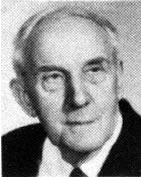 One honourable member who lamented the passage of travel by rail was Bert Herridge from Kootenay West in British Columbia. Not only did he regret the decline in rail travel by his colleagues, but as a representative of his constituents he was a ceaseless advocate for the retention of the Kettle Valley Railway.
One honourable member who lamented the passage of travel by rail was Bert Herridge from Kootenay West in British Columbia. Not only did he regret the decline in rail travel by his colleagues, but as a representative of his constituents he was a ceaseless advocate for the retention of the Kettle Valley Railway.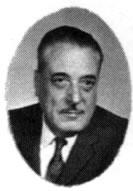 One member from Vancouver, Harold Winch, who became a well-known figure on Parliament Hill, was also a former representative of the CFF who had made the successful transition to the NDP. He was at all times a doughty spokesman for his constituents, and possessed an amiable personality, liked by parliamentarians in all parties. He believed in the efficacy of friendly persuasion, especially when sharing a beverage with an adversary. That was during the years when "beverage" was the accepted term in straitlaced Ontario for spirituous liquor. "What beverage would you like?" was thought to be more socially acceptable than "What are you drinking?"
One member from Vancouver, Harold Winch, who became a well-known figure on Parliament Hill, was also a former representative of the CFF who had made the successful transition to the NDP. He was at all times a doughty spokesman for his constituents, and possessed an amiable personality, liked by parliamentarians in all parties. He believed in the efficacy of friendly persuasion, especially when sharing a beverage with an adversary. That was during the years when "beverage" was the accepted term in straitlaced Ontario for spirituous liquor. "What beverage would you like?" was thought to be more socially acceptable than "What are you drinking?"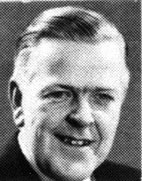 A third member from British Columbia who held a position of influence within the Progressive Conservative Party was the Hon. E. Davie Fulton. His political lineage was impressive. His grandfather and a great uncle both were Premiers of the Province of British Columbia, and his father had been an elected member of the House of Commons in Ottawa. He was a Rhodes Scholar at a time when that carried a certain cachet in Canada, and had served his country overseas during World War II, reaching the rank of Major.
A third member from British Columbia who held a position of influence within the Progressive Conservative Party was the Hon. E. Davie Fulton. His political lineage was impressive. His grandfather and a great uncle both were Premiers of the Province of British Columbia, and his father had been an elected member of the House of Commons in Ottawa. He was a Rhodes Scholar at a time when that carried a certain cachet in Canada, and had served his country overseas during World War II, reaching the rank of Major.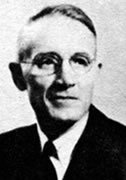
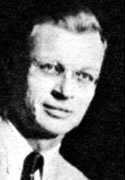
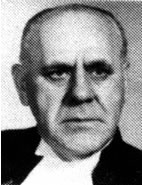 Herman Maxwell Batten, the Member for Humber-St. George's, was all that his name implied. A conscientious, hard working representative of his constituents and his province, he was a respected and well-liked backbencher who rose to become Deputy Speaker of the House in succession to Lucien Lamoureux, of whom more anon.
Herman Maxwell Batten, the Member for Humber-St. George's, was all that his name implied. A conscientious, hard working representative of his constituents and his province, he was a respected and well-liked backbencher who rose to become Deputy Speaker of the House in succession to Lucien Lamoureux, of whom more anon.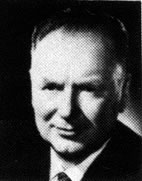 On becoming a Hansard reporter in the Commons, my first and most important task was to learn the names of the Members, and of their ridings. Much time was spent memorising faces and names, and spent well. I only had to hear the Speaker recognize the Honourable Member for Grand Falls-White Bay-Labrador when I knew the member's name was Granger, Charles Granger.
On becoming a Hansard reporter in the Commons, my first and most important task was to learn the names of the Members, and of their ridings. Much time was spent memorising faces and names, and spent well. I only had to hear the Speaker recognize the Honourable Member for Grand Falls-White Bay-Labrador when I knew the member's name was Granger, Charles Granger.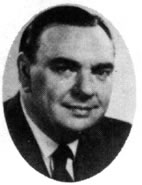 Unfortunately, Mr. Granger did not remain the member. A Mr. Don Jamieson became the new member, and in fact went on to become Secretary of State for External Affairs in one of Trudeau's cabinets. Round faced, roly poly, with bulbous eyes, he looked nothing like Mr. Granger, but forever linked for me was Granger with Grand Falls-White Bay-Labrador. Thus, whenever I had occasion to address the new member, who in time became an important Minister of State, I invariably used the name "Granger".
Unfortunately, Mr. Granger did not remain the member. A Mr. Don Jamieson became the new member, and in fact went on to become Secretary of State for External Affairs in one of Trudeau's cabinets. Round faced, roly poly, with bulbous eyes, he looked nothing like Mr. Granger, but forever linked for me was Granger with Grand Falls-White Bay-Labrador. Thus, whenever I had occasion to address the new member, who in time became an important Minister of State, I invariably used the name "Granger".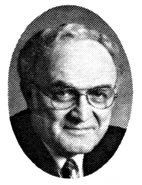 A fourth member from Newfoundland who rose to prominence in the House of Commons was the Honourable James McGrath. He, too, had a good speaking voice. His arguments were incisive, his thinking clear-headed, and his future promised rapid advancement. Regrettably that future never fully blossomed. As the Member for St. John's East he had the misfortune to have as the representative for St. John's West the charismatic John Carnell Crosbie, he of the ready tongue and quick quip.
A fourth member from Newfoundland who rose to prominence in the House of Commons was the Honourable James McGrath. He, too, had a good speaking voice. His arguments were incisive, his thinking clear-headed, and his future promised rapid advancement. Regrettably that future never fully blossomed. As the Member for St. John's East he had the misfortune to have as the representative for St. John's West the charismatic John Carnell Crosbie, he of the ready tongue and quick quip..jpg) The Hon. John Pickersgill, "Jumping Jack Pickersgill", Ontario born, Manitoba educated, and an outsider, represented the Newfoundland riding of Bonavista-Twillingate, and was first elected to the House of Commons in 1953. Prior to that he had spent fifteen years in the PMO (Office of the Prime Minister) in Ottawa, where he became private secretary to Mackenzie King, the Prime Minister regularly returned to office, general election after general election, with two exceptions, during the period 1921 to 1948.
The Hon. John Pickersgill, "Jumping Jack Pickersgill", Ontario born, Manitoba educated, and an outsider, represented the Newfoundland riding of Bonavista-Twillingate, and was first elected to the House of Commons in 1953. Prior to that he had spent fifteen years in the PMO (Office of the Prime Minister) in Ottawa, where he became private secretary to Mackenzie King, the Prime Minister regularly returned to office, general election after general election, with two exceptions, during the period 1921 to 1948.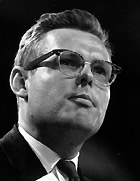 An outstanding incident for me came during one of the first House of Commons committee meetings that I helped report. It was in 1961 when the subject of generating energy using uranium was being examined. Debate centred on which of two types of reactors provided the cheapest and safest means of doing so. The Canadian uranium industry had a vital interest in the outcome of the committee hearings.
An outstanding incident for me came during one of the first House of Commons committee meetings that I helped report. It was in 1961 when the subject of generating energy using uranium was being examined. Debate centred on which of two types of reactors provided the cheapest and safest means of doing so. The Canadian uranium industry had a vital interest in the outcome of the committee hearings.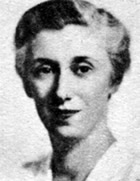 The
Honourable Ellen Fairclough, long-serving Member for Hamilton West, was the first woman to be appointed a federal cabinet minister in the history of Canada. Prime Minister Diefenbaker was proud to have made that historic appointment, and should have been well pleased with the manner in which she filled her ministerial portfolios, first as Secretary of State and subsequently as Minister of Citizenship and Immigration.
The
Honourable Ellen Fairclough, long-serving Member for Hamilton West, was the first woman to be appointed a federal cabinet minister in the history of Canada. Prime Minister Diefenbaker was proud to have made that historic appointment, and should have been well pleased with the manner in which she filled her ministerial portfolios, first as Secretary of State and subsequently as Minister of Citizenship and Immigration.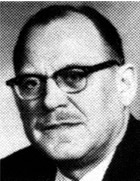 Another Ontario member to make it to cabinet was Richard Bell, the member for Carleton (Ottawa), who held the post of Minister of Citizenship and Immigration in 1962, in Diefenbaker's last government.
Another Ontario member to make it to cabinet was Richard Bell, the member for Carleton (Ottawa), who held the post of Minister of Citizenship and Immigration in 1962, in Diefenbaker's last government.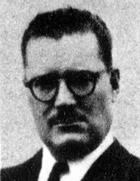 A big man was the Member for Port Arthur, with a big frame, and a big reputation. Douglas Fisher, CCF and later NDP stalwart, made a sensational entrance on the national political scene by defeating the formidable C.D. Howe, "Minister for Everything" in the cabinets of Mackenzie King and Louis St.-Laurent, in the General Election of 1957.
A big man was the Member for Port Arthur, with a big frame, and a big reputation. Douglas Fisher, CCF and later NDP stalwart, made a sensational entrance on the national political scene by defeating the formidable C.D. Howe, "Minister for Everything" in the cabinets of Mackenzie King and Louis St.-Laurent, in the General Election of 1957.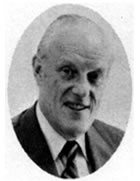 One decent man who showed that a backbencher, if he was sincere and showed persistence, could make his mark on the House of Commons, was Alfred Hales, the Member for Wellington South. Looking back at his presence in the House, to which he was first elected in 1957 at the age of 48, there was nothing to tell that the tall man with a pleasant face, calm in speech, quiet in manner, would leave a legacy that has lasted into the 21st century and may well continue for many decades to come.
One decent man who showed that a backbencher, if he was sincere and showed persistence, could make his mark on the House of Commons, was Alfred Hales, the Member for Wellington South. Looking back at his presence in the House, to which he was first elected in 1957 at the age of 48, there was nothing to tell that the tall man with a pleasant face, calm in speech, quiet in manner, would leave a legacy that has lasted into the 21st century and may well continue for many decades to come.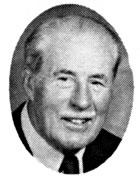 A big hitter in every sense of the word was the Honourable George Hees, member for Toronto-Broadview. Tall, mustached, athletic all his life, he had been a Brigade Major who served overseas in World War II, and thereafter became a veterans' veteran. He had a rapport with the men and women who had served Canada in war and peace that has seldom, if ever, been equalled.
A big hitter in every sense of the word was the Honourable George Hees, member for Toronto-Broadview. Tall, mustached, athletic all his life, he had been a Brigade Major who served overseas in World War II, and thereafter became a veterans' veteran. He had a rapport with the men and women who had served Canada in war and peace that has seldom, if ever, been equalled.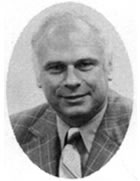 The star-crossed career of the Honourable Paul Hellyer was one of the more remarkable that it was my lot to observe as reporter and editor. Astrologists may see in it a human born under the zodiacal sign of Leo, destined to be a leader, but flawed by the inability to attract huge numbers of followers.
The star-crossed career of the Honourable Paul Hellyer was one of the more remarkable that it was my lot to observe as reporter and editor. Astrologists may see in it a human born under the zodiacal sign of Leo, destined to be a leader, but flawed by the inability to attract huge numbers of followers.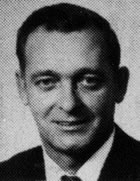 No record of Alberta Members would be complete without reference to the two Horners, John Henry (Jack), and Hugh Horner, two years his senior. As a matter of interest, when they both entered Parliament following the General Election of 1958, they did so in company with a third Horner, Albert, who was their uncle. Albert represented the Saskatchewan riding of The Battlefords, Hugh the riding of Jasper-Edson, and Jack the riding of Acadia, both in Alberta.
No record of Alberta Members would be complete without reference to the two Horners, John Henry (Jack), and Hugh Horner, two years his senior. As a matter of interest, when they both entered Parliament following the General Election of 1958, they did so in company with a third Horner, Albert, who was their uncle. Albert represented the Saskatchewan riding of The Battlefords, Hugh the riding of Jasper-Edson, and Jack the riding of Acadia, both in Alberta.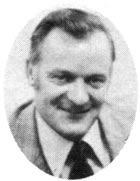 Of the three Horners Jack was the most colourful character. A rancher, he spoke his mind plainly, and he commanded an audience. Trudeau, the urbane world traveller, product of Canadian and European universities, yet a man who loved outdoor life, paid Jack the compliment of listening seriously to what he said. In the Chamber of the Commons the rancher and the Prime Minister had an unspoken respect for each other.
Of the three Horners Jack was the most colourful character. A rancher, he spoke his mind plainly, and he commanded an audience. Trudeau, the urbane world traveller, product of Canadian and European universities, yet a man who loved outdoor life, paid Jack the compliment of listening seriously to what he said. In the Chamber of the Commons the rancher and the Prime Minister had an unspoken respect for each other.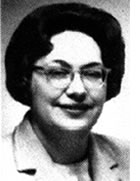 One name forever associated with Canada's centennial celebrations in 1967 is the Honourable Judy LaMarsh, a lady who endured some of the most hurtful barbs ever fired by political opponents and, it must be said, by those in the media who took a personal dislike to her.
One name forever associated with Canada's centennial celebrations in 1967 is the Honourable Judy LaMarsh, a lady who endured some of the most hurtful barbs ever fired by political opponents and, it must be said, by those in the media who took a personal dislike to her.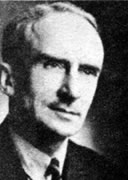 Like some dimly perceived wraith, an almost transparent shadow from an age long past, the Honourable James Macdonnell, Member for Toronto-Greenwood, was known as "the conscience of the Progressive Conservative Party" during the Diefenbaker years.
Like some dimly perceived wraith, an almost transparent shadow from an age long past, the Honourable James Macdonnell, Member for Toronto-Greenwood, was known as "the conscience of the Progressive Conservative Party" during the Diefenbaker years. 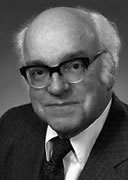 Heath Macquarrie was a man of varied parts. A long-serving Member for the riding of Queens, Prince Edward Island, he played many roles, teacher, political science professor, radio commentator on international affairs, member of many Canadian and international associations, including the Hansard Society, and Canadian delegate to the United Nations. With such a wide scope of interests he could well have aspired to Cabinet. But Prince Edward Island, with its four seats in the Commons, could not be rewarded with two Cabinet posts, and he served out his career in the Commons as a backbencher, later being rewarded with a seat in the Senate to which he was appointed by Prime Minister Mulroney.
Heath Macquarrie was a man of varied parts. A long-serving Member for the riding of Queens, Prince Edward Island, he played many roles, teacher, political science professor, radio commentator on international affairs, member of many Canadian and international associations, including the Hansard Society, and Canadian delegate to the United Nations. With such a wide scope of interests he could well have aspired to Cabinet. But Prince Edward Island, with its four seats in the Commons, could not be rewarded with two Cabinet posts, and he served out his career in the Commons as a backbencher, later being rewarded with a seat in the Senate to which he was appointed by Prime Minister Mulroney.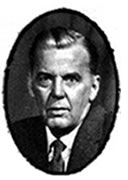 The Minister for Posts was the Honourable Eric Kierans, an irrepressible jokester. He was seated in his place as Macquarrie rose to address the almost vacant Chamber.
The Minister for Posts was the Honourable Eric Kierans, an irrepressible jokester. He was seated in his place as Macquarrie rose to address the almost vacant Chamber.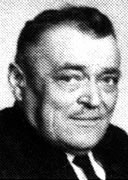 One of the few men who toiled in the backbenches of the PC Party, almost unnoticed, is one whose main claim to inclusion in this narrative is that he had been born in Ukraine. Many others whose birth places lay far from Canada have been elected to Parliament in the ensuing years. As a matter of fact, in the ever-changing mosaic that reflects the face of Canada, colour, creed, garb, and variations in accent are widely represented in the Commons of the 21st century. As time passes, this may become so common that it will be unworthy of notice.
One of the few men who toiled in the backbenches of the PC Party, almost unnoticed, is one whose main claim to inclusion in this narrative is that he had been born in Ukraine. Many others whose birth places lay far from Canada have been elected to Parliament in the ensuing years. As a matter of fact, in the ever-changing mosaic that reflects the face of Canada, colour, creed, garb, and variations in accent are widely represented in the Commons of the 21st century. As time passes, this may become so common that it will be unworthy of notice.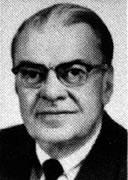 The Martin family's political story is by now well-known throughout Canada. It was my privilege to report both father and son when I served with Hansard, and I base my observations on their performances as members of that very select club, the House of Commons.
The Martin family's political story is by now well-known throughout Canada. It was my privilege to report both father and son when I served with Hansard, and I base my observations on their performances as members of that very select club, the House of Commons.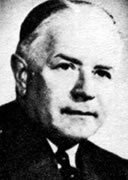 Linked inextricably in memory's eye with Paul Martin senior is the Honourable Lionel Chevrier. Both were born in the same year, 1903. Both were stalwarts of the Liberal Party. Both were called to the Cabinet in 1947. Both served as Canadian High Commissioner in London after the termination of their political lives.
Linked inextricably in memory's eye with Paul Martin senior is the Honourable Lionel Chevrier. Both were born in the same year, 1903. Both were stalwarts of the Liberal Party. Both were called to the Cabinet in 1947. Both served as Canadian High Commissioner in London after the termination of their political lives.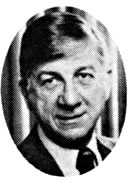 During his thirty years as Member of Parliament the Honourable Erik Nielsen carved out a remarkable career of many firsts, and few lasts. To begin with, he represented Yukon Territory, a name conjuring up tales of the midnight sun, men struggling against nature through the Whitehorse Pass on their way to the Klondike gold fields, and of the writers Jack London and Robert Service.
During his thirty years as Member of Parliament the Honourable Erik Nielsen carved out a remarkable career of many firsts, and few lasts. To begin with, he represented Yukon Territory, a name conjuring up tales of the midnight sun, men struggling against nature through the Whitehorse Pass on their way to the Klondike gold fields, and of the writers Jack London and Robert Service.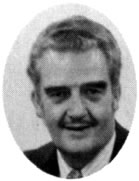
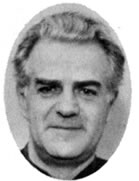
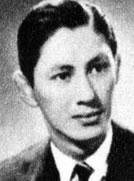 Ethnic representation in the Canadian House of Commons reflecting the growing diverse nature of immigration from countries world-wide began with a few nervous steps taken by the government led by the Right Hon. John George Diefenbaker in the late 1950s.
Ethnic representation in the Canadian House of Commons reflecting the growing diverse nature of immigration from countries world-wide began with a few nervous steps taken by the government led by the Right Hon. John George Diefenbaker in the late 1950s.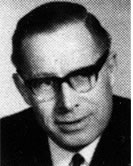 Forever associated with the adoption of the Maple Leaf as Canada's national flag is the name of John Ross Matheson. Of Scottish decent, he represented the riding of Leeds in Ontario.
Forever associated with the adoption of the Maple Leaf as Canada's national flag is the name of John Ross Matheson. Of Scottish decent, he represented the riding of Leeds in Ontario.
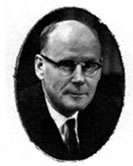 "Leave it to George." The George in this case was the Honourable George James McIlraith, Q.C., long-time representative of Ottawa West, who by dint of perseverance succeeded in becoming almost a permanent fixture in the machine that ran the Liberal Party, and hence the Government of Canada, for most of the years from 1940 to his retirement as Senator in 1983.
"Leave it to George." The George in this case was the Honourable George James McIlraith, Q.C., long-time representative of Ottawa West, who by dint of perseverance succeeded in becoming almost a permanent fixture in the machine that ran the Liberal Party, and hence the Government of Canada, for most of the years from 1940 to his retirement as Senator in 1983.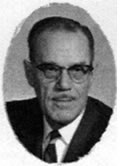 Jay Waldo Monteith. The name has to be spoken aloud to savour the fullness of it. Born in 1903, his lineage included a grandfather, member of the Ontario Legislature from 1867 to 1873, and his father, member of the Ontario Legislature from 1923 to 1934.
Jay Waldo Monteith. The name has to be spoken aloud to savour the fullness of it. Born in 1903, his lineage included a grandfather, member of the Ontario Legislature from 1867 to 1873, and his father, member of the Ontario Legislature from 1923 to 1934.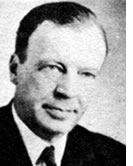 There were two Nowlans, father and son, who came into my ken during the time I worked on Hansard. The father, the Honourable George Clyde Nowlan, set standards that were high for the son to emulate, and comparisons were inevitable.
There were two Nowlans, father and son, who came into my ken during the time I worked on Hansard. The father, the Honourable George Clyde Nowlan, set standards that were high for the son to emulate, and comparisons were inevitable.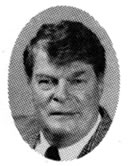 His son, John Patrick Nowlan, foreshortened to Pat, undoubtedly took the short end of the stick when gauged against the father, but this is oversimplification. Born in 1931, he was a child during World War II, and like many a maritimer before him he left Nova Scotia to earn a living elsewhere. That elsewhere happened to be British Columbia, at the far end of the country, where he practised law.
His son, John Patrick Nowlan, foreshortened to Pat, undoubtedly took the short end of the stick when gauged against the father, but this is oversimplification. Born in 1931, he was a child during World War II, and like many a maritimer before him he left Nova Scotia to earn a living elsewhere. That elsewhere happened to be British Columbia, at the far end of the country, where he practised law.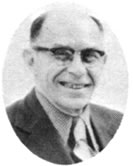 Of the almost 3,000 Canadians who served as Members of Parliament from 1960 to 1994, 1,106 were new Members whose faces and voices had to be recognized by the staffs of two branches, the Clerks at the Table and the people of Hansard, English and French.
Of the almost 3,000 Canadians who served as Members of Parliament from 1960 to 1994, 1,106 were new Members whose faces and voices had to be recognized by the staffs of two branches, the Clerks at the Table and the people of Hansard, English and French.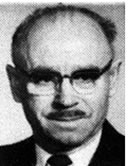 Reynold Rapp, the member for Humboldt-Melfort-Tisdale, occupies a special niche in any work dealing with the accomplishments of backbenchers. His story is overlooked, and merits at least a brief retelling.
Reynold Rapp, the member for Humboldt-Melfort-Tisdale, occupies a special niche in any work dealing with the accomplishments of backbenchers. His story is overlooked, and merits at least a brief retelling.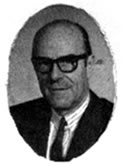 Mention of Mr. Rapp's acquisition of Canadian citizenship causes the intrusion of another personal note and an acknowledgment of the selfless work, as parliamentarian and citizenship judge, performed by the long-tenured Member for Ottawa East, Jean-Thomas Richard.
Mention of Mr. Rapp's acquisition of Canadian citizenship causes the intrusion of another personal note and an acknowledgment of the selfless work, as parliamentarian and citizenship judge, performed by the long-tenured Member for Ottawa East, Jean-Thomas Richard.